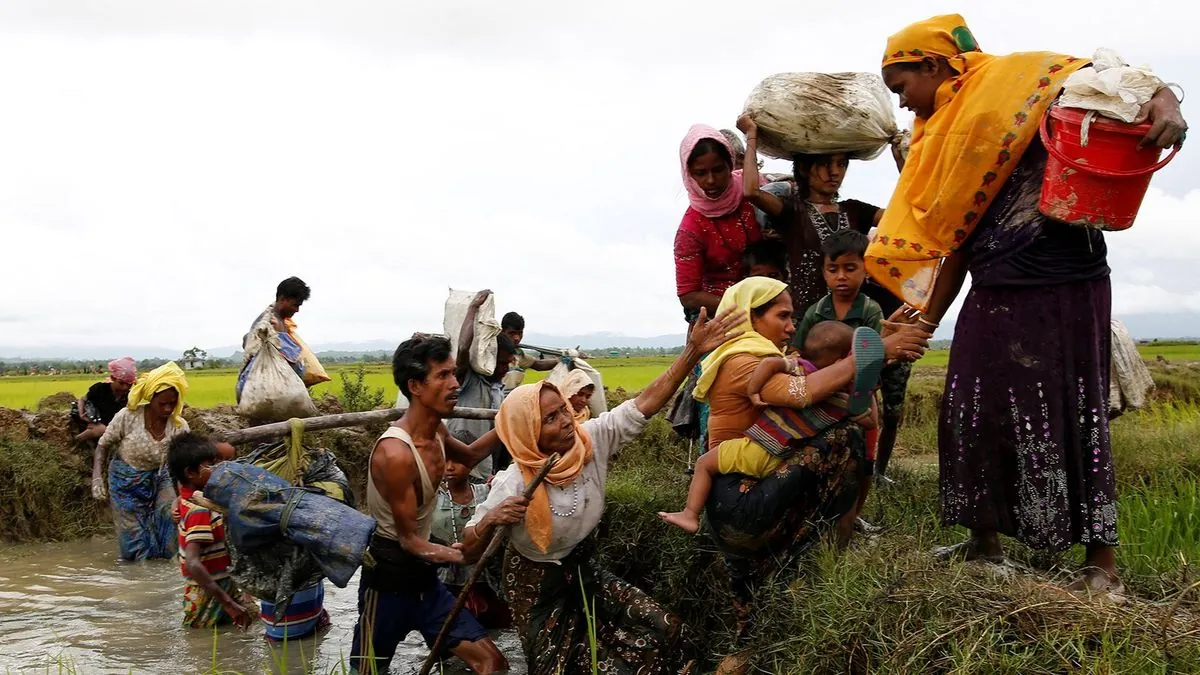In a tragic turn of events, a drone strike targeting Rohingya refugees attempting to cross from Myanmar into Bangladesh has resulted in a significant loss of life. The incident, which occurred on August 7, 2024, has drawn international attention and raised concerns about the ongoing humanitarian crisis in the region.
Multiple eyewitnesses reported that the attack claimed dozens of lives, including those of families with young children. The assault, which took place near the coastal town of Maungdaw in Rakhine State, is believed to be the deadliest single incident involving civilians in the area since the recent escalation of hostilities between Myanmar's military junta and rebel forces.
Mohammed Eleyas, a 35-year-old survivor, recounted the harrowing experience of losing his pregnant wife and 2-year-old daughter in the attack. He described the chaos that ensued as drones targeted the crowds gathered along the shoreline:
"I heard the deafening sound of shelling multiple times. When I got up, I saw my wife and daughter critically injured and many of my other relatives dead."
The incident has reignited discussions about the plight of the Rohingya, a Muslim minority group that has faced decades of persecution in predominantly Buddhist Myanmar. Since 2017, over 730,000 Rohingya have fled to neighboring Bangladesh following a military crackdown that the United Nations characterized as having "genocidal intent."
The recent attack has further complicated the already volatile situation in Rakhine State. The Arakan Army, an ethnic armed group fighting for greater autonomy in the region, has made significant territorial gains in recent weeks. This has prompted many Rohingya to flee their homes, with Maungdaw becoming one of the last major Rohingya settlements outside of displacement camps.
Conflicting reports have emerged regarding responsibility for the drone strike. While some witnesses attributed the attack to the Arakan Army, the group has vehemently denied these allegations. Both the Arakan Army and Myanmar's military junta have accused each other of carrying out the assault.
The international community has responded with alarm to the reports of civilian casualties. Bob Rae, Canada's ambassador to the United Nations, confirmed the accuracy of the reports, stating that hundreds of Rohingya had been killed at the Myanmar-Bangladesh border.
Humanitarian organizations have also voiced their concerns. Médecins Sans Frontières reported treating 39 individuals who had crossed into Bangladesh since August 3, 2024, for violence-related injuries, including wounds from mortar shells and gunshots.
As the situation continues to unfold, the incident serves as a stark reminder of the ongoing challenges faced by the Rohingya population. With over 1 million Rohingya refugees currently residing in Bangladesh's Cox's Bazar, the world's largest refugee settlement, the need for a lasting solution to the crisis remains more pressing than ever.
The international community now faces the task of addressing the immediate humanitarian needs of those affected by the recent violence while also working towards a long-term resolution that ensures the safety and rights of the Rohingya people.
